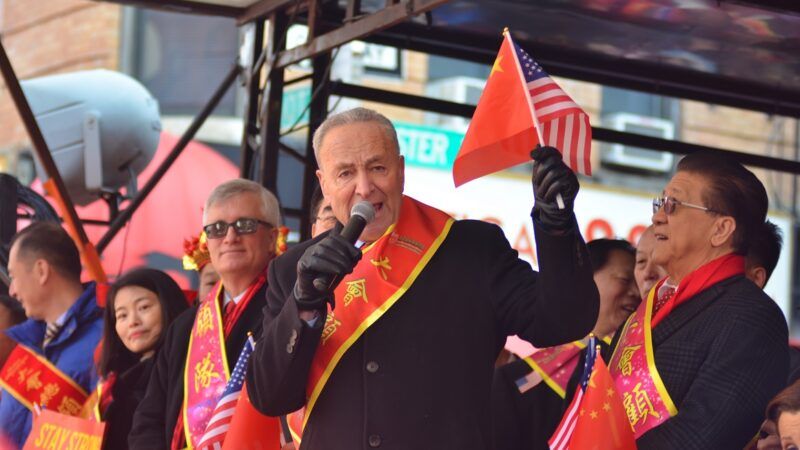Immigration Is the Most Important Way To Beat China
The Senate’s Endless Frontier Act aims to spur innovation but leaves out immigration reform.

The Senate will soon consider a bill that supporters say will help U.S. companies compete against China with innovative products. However, the bill leaves out the most vital element: talented people to produce the innovations.
Senate Majority Leader Chuck Schumer (D–N.Y.) plans to move forward with his Endless Frontier Act, which has several Republican co-sponsors and was approved by the Senate Commerce Committee on May 13. The bill gives new planning authority to the National Science Foundation, but contains no provisions to welcome and retain high-skilled foreign nationals, who in recent years have accounted for 70 to 80 percent of the full-time graduate students at U.S. universities in computer science and electrical engineering.
Advocates of industrial policy argue trade protection and government planning increase innovation. A review of the economic literature shows this is not the case. The critical factors for innovation are imports, competition, and immigration.
Immigration's impact on innovation is clear. As economists Giovanni Peri, Kevin Shih, and Chad Sparber found in a 2015 study, "When we aggregate at the national level, inflows of foreign STEM [science, technology, engineering, and math] workers explain between 30% and 50% of the aggregate productivity growth that took place in the United States between 1990 and 2010" [emphasis added].
Innovations are often developed through forming new companies. Research from the organization I lead, the National Foundation for American Policy, concluded that more than half of America's billion-dollar startups had at least one immigrant founder.
For example, semiconductors dominate the competitiveness debate, and immigrants helped start the two companies making much of the innovation in chips possible: Synopsys and Cadence Design Systems. Jim Keller, who has designed chips at Apple, Tesla, and Intel, and other companies in the field, pointed out a great deal of innovation was taking place in America in chip design but that "little of the activity would be possible…without advances in design software by Synopsys and its biggest rival, Cadence Design Systems," according to The New York Times.
The public-private consortium Manufacturing USA program, tasked with a central role in the Endless Frontier Act, has highlighted the cutting-edge robotics research of University of Connecticut associate professor Ashwin Dani, who came to America as an international student from India. However, more favorable legal pathways for students to work after graduation in our northern neighbor have doubled the number of Indians immigrating to Canada. At the same time, international students from India in graduate-level computer science and engineering programs in the U.S. declined by more than 25 percent in 2018–2019, deterred by restrictions on H-1B visas and long green card waits for Indians because of per-country limits and low annual ceilings on employment-based immigration.
The bill also provides funding for STEM education but appears to provide fewer U.S. student scholarships than the $1,500 scholarship and training fee that employers currently pay when they petition for an H-1B visa holder. Virtually ignored in the debate over producing more U.S. STEM graduates, that H-1B fee has funded approximately 100,000 scholarships for U.S. students in STEM fields over the past 20 years.
Congress should heed the advice of the National Security Commission on Artificial Intelligence (NSCAI) and enact policies to attract and retain foreign-born talent. The NSCAI advocated in its final report to create a startup visa for immigrant entrepreneurs, at least double the annual number of employment-based green cards, and eliminate the per-country limit (to prevent waits for permanent residence that can last decades). The commission also recommended expanding H-1B visas, typically the only practical way for a high-skilled foreign national to work long-term in America, while establishing a new "emerging and disruptive technology" visa.
Congress can follow the commission's advice to exempt from the annual limits for green cards international students who earn PhDs in STEM fields or, better yet, do so for master's degree students as well. Legislation can also provide work authorization to bridge the gap for students who complete their degrees and must wait for employment-based green cards, as in the Biden-supported U.S. Citizenship Act.
If the Senate starts to move forward with the Endless Frontier Act, we should expect an amendment from Sen. Tom Cotton (R–Ark.) and Sen. Marsha Blackburn (R–Tenn.) that mirrors their Secure Campus Act. That bill prohibits Chinese graduate students from studying in STEM fields at U.S. universities. But the NSCAI concluded that banning Chinese graduate students from U.S. university STEM fields would be a gift to the Chinese Communist Party. "Immigration policy can also slow China's progress," according to the final report. "China's government takes the threat of brain drain seriously, noting that the United States' ability to attract and retain China's talent is an obstacle to the Chinese Communist Party's (CCP) ambitions. Increasing China's brain drain will create a dilemma for the CCP—which will be forced to choose between losing even more human capital, further slowing their economic growth and threatening their advancement in AI, or denying Chinese nationals opportunities to study and work in the United States."
Former Google CEO Eric Schmidt, the NSCAI chair, was asked about Chinese students at a congressional hearing. "It turns out the Chinese researchers are the number one authors on the key [A.I.] papers," said Schmidt. "If you were to get rid of all of them…you will, in fact, hurt America's A.I. leadership."
The vast majority of the graduate students at U.S. universities in math, engineering, and computer science are international students, primarily from China and India. If the Biden administration keeps a last-minute Trump regulation to make it more difficult for international students to gain H-1B visas by eliminating the H-1B lottery and favoring older foreign professionals, attracting new talent will get much more difficult.
No legislation is likely to help American companies outcompete their Chinese counterparts if Congress and the executive branch fail to enact more welcoming policies—or worse, impose new immigration restrictions.


Show Comments (140)